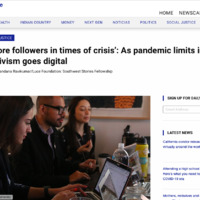Item
‘We get more followers in times of crisis’: As pandemic limits in-person protests, organizers digitize activism
Media
Title (Dublin Core)
‘We get more followers in times of crisis’: As pandemic limits in-person protests, organizers digitize activism
Description (Dublin Core)
by Jessica Myers for the Luce Foundation: Southwest Stories Fellowship
by Vandana Ravikumar for the Luce Foundation: Southwest Stories Fellowship
.
Civil rights marches. Anti-war protests. Rallies against gun violence.
Public demonstrations historically have involved the “mass mobilization of bodies,” according to Tiera Rainey, program director for the Tucson Second Chance Community Bail Fund.
But when the novel coronavirus struck, prompting warnings against crowds and close contact, Arizona’s new reality of social distancing forced organizers to rethink that framework.
“Coming together is a challenge in a pandemic,” said Rainey, who also is an organizer for Black Lives Matter Tucson. “Creating virtual community and innovation ... has been really important in this moment.”
Organizers had digitized some advocacy work well before COVID-19 arrived in March. But with the crisis pushing more people online – internet use surged 50% to 70% in response to closures and other COVID-19 restrictions, according to Forbes – virtual activism became the primary tool for agitators seeking to build connections and momentum, not just a complementary one.
Public demonstrations historically have involved the “mass mobilization of bodies,” according to Tiera Rainey, program director for the Tucson Second Chance Community Bail Fund.
But when the novel coronavirus struck, prompting warnings against crowds and close contact, Arizona’s new reality of social distancing forced organizers to rethink that framework.
“Coming together is a challenge in a pandemic,” said Rainey, who also is an organizer for Black Lives Matter Tucson. “Creating virtual community and innovation ... has been really important in this moment.”
Organizers had digitized some advocacy work well before COVID-19 arrived in March. But with the crisis pushing more people online – internet use surged 50% to 70% in response to closures and other COVID-19 restrictions, according to Forbes – virtual activism became the primary tool for agitators seeking to build connections and momentum, not just a complementary one.
Date (Dublin Core)
September 14, 2020
Creator (Dublin Core)
Jessica Myers
Vandana Ravikumar
Contributor (Dublin Core)
Jessica Myers
Vandana Ravikumar
Event Identifier (Dublin Core)
Cronkite-Luce Fellowship
Partner (Dublin Core)
Arizona State University
Type (Dublin Core)
Text story
Controlled Vocabulary (Dublin Core)
English
Protest
English
Social Issues
English
Technology
English
Community & Community Organizations
Curator's Tags (Omeka Classic)
activism
advocacy
internet
funding
social change
virtual
Contributor's Tags (a true folksonomy) (Friend of a Friend)
Luce Grant
Collection (Dublin Core)
Luce Grant
Exhibit (Dublin Core)
Southwest Stories>Schools, Services & Small Businesses
Southwest Stories>Jessica Myers
Southwest Stories>Vandana Ravikumar
Date Submitted (Dublin Core)
09/19/2020
Date Modified (Dublin Core)
09/21/2020
10/22/2020
07/15/2021
Linked resources
Filter by property
| Title | Alternate label | Class |
|---|---|---|
 We get more followers in times of crisis’: As pandemic limits in-person action, activism goes digital We get more followers in times of crisis’: As pandemic limits in-person action, activism goes digital |
Linked Data | Interactive Resource |
This item was submitted on September 19, 2020 by Jessica Myers using the form “Share Your Story” on the site “A Journal of the Plague Year”: https://covid-19archive.org/s/archive
Click here to view the collected data.